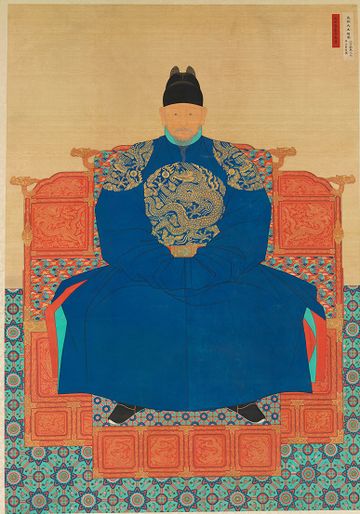조선태조어진
| 조선태조어진 Portrait of King Taejo of Joseon |
|
 조선태조어진, 국가문화유산포털, 문화재청. |
|
| 대표명칭 | 조선태조어진 |
|---|---|
| 영문명칭 | Portrait of King Taejo of Joseon |
| 한자 | 朝鮮太祖御眞 |
| 주소 | 전라북도 전주시 완산구 태조로 44-0 (풍남동3가, 경기전 경기전) 어진박물관 |
| 지정(등록) 종목 | 국보 제317호 |
| 지정(등록)일 | 2012년 6월 29일 |
| 분류 | 유물/일반회화/인물화/초상화 |
| 시대 | 조선시대 |
| 수량/면적 | 1폭 |
| 웹사이트 | 조선태조어진, 국가문화유산포털, 문화재청. |
해설문
국문
어진은 왕의 초상화이다. 조선태조어진은 조선을 건국한 태조 이성계의 초상화로 조선왕조를 상징한다.
전주는 태조 이성계의 선조들이 살았던 조선 왕실의 본향이다. 조선은 건국 후 태종 10년(1410)에 조선왕실이 일어난 전주에 태조의 어진을 봉안하였다. 그 후 경기전에 모신 태조어진이 낡아서, 고종 9년(1872)에 태조어진을 모사*하여 다시 모셨다.
태조어진은 전주를 비롯해 태조가 태어난 영흥, 고구려의 왕도 평양, 신라의 왕도 경주, 고려의 왕도 개경 등 지방 5곳에 모셨으나 현재는 전주 경기전의 태조어진만이 유일하게 남아 있다.
조선을 건국한 태조 이성계의 권위와 위엄이 돋보이는 태조어진은 왕이 평상시 집무할 때 입는 청색의 곤룡포에 모자인 익선관을 쓰고 검은 가죽신을 신은 전신상으로, 가슴과 어깨에는 왕을 상징하는 다섯 발톱을 가진 용이 그려져 있으며, 비단의 뒷면에 색을 칠하여 색감이 앞으로 배어 나오게 하는 배채법으로 그려져 색감이 은은하고 깊다.
또한 고종 9년에 새로 모신 태조어진은 경기전의 태조어진을 모사하여 숙종 14년(1688)에 한양 영희전**에 모신 어진을 다시 모사한 것이어서, 조선 초기의 어진 제작기법을 충실하게 반영하고 있다.
현재 경기전 정전에 모셔진 태조어진은 1999년에 모사한 것이며, 국보로 지정된 조선태조어진 진본은 어진박물관에 모셔져 있다.
- 모사(模寫): 어떤 그림을 본보기로 그와 똑같이 본을 떠서 그림
- 영희전(永禧殿): 조선시대 태조·세조·원종·숙종·영조·순조의 어진을 모셨던 한양의 전각
영문
Portrait of King Taejo of Joseon
This portrait enshrined in the main hall of Gyeonggijeon Shrine depicts the founder of the Joseon dynasty (1392-1910), Yi Seong-gye (1335-1408), known posthumously as King Taejo (r. 1392-1398). Made in 1999, the portrait is a copy of an 1872 portrait of the king. This 1872 portrait, designated as a National Treasure in 2012, is of particular value as it is the only remaining Joseon-period portrait of Joseon's founding king. To ensure its preservation, it has been kept at the Royal Portrait Museum, located behind Gyeonggijeon Shrine, since 2010.
In Korea, a portrait is traditionally exhibited in a shrine as a symbolic object of ancestor veneration. During the Joseon period, there were several shrines across the country where a portrait of King Taejo was enshrined. This required the production of copies of the original portrait. As the portraits were subject to deterioration over time, they were also reproduced over the years as needed.
The first portrait of King Taejo enshrined at Gyeonggijeon Shrine was made in 1409 based on the original 1398 portrait. In 1688, the 1409 portrait was used to create a portrait for Yeonghuijeon, a shrine in the capital dedicated to the Joseon kings. By 1872, the 1409 portrait had deteriorated, so the 1688 portrait was used to create a new portrait for Gyeonggijeon Shrine. Thus, despite having been made in the late 19th century, the 1872 portrait preserves the characteristic features and style of the early Joseon period.
Painted on a silk canvas, the portrait uses a coloring technique whereby paint is applied to the back of the canvas to let it seep through to the front, thus creating deep and subtle colors. The king is depicted in an imposing and stately manner appropriate for a founding king. He is seated on a throne wearing his daily uniform, consisting of a blue robe, a winged cap, and black leather boots. The shoulders and chest of the robe are decorated in gold with designs depicting five-clawed dragons, a symbol of the king.
- 외국인을 위해 어진의 의의, 만드는 과정 등에 대한 배경 정보 추가
- 태조어진이 모셔졌던 곳이 언급한 5군데 외에 있었고, 경기전 해설문과 내용이 겹치는 부분이 있어서 내용을 좀 수정했어요.
영문 해설 내용
이 초상화는 조선을 건국한 태조 이성계(1335-1408, 재위 1392-1398)를 그린 것으로 조선왕조를 상징하는 문화유산이다.
조선시대 태조어진은 태조의 선조들이 대대로 살았던 전주를 비롯해 태조가 태어난 영흥, 고구려의 왕도 평양, 신라의 왕도 경주, 고려의 왕도 개경 등 지방 5곳에 모셨으나 현재는 전주의 태조어진만이 유일하게 남아 있다.
조선 건국 후인 1410년 태조의 어진이 전주에 봉안되었고, 어진을 모신 곳을 경기전이라 이름하였다. 1410년 처음 경기전에 모신 어진은 1398년 경주에 모셔진 본을 모사한 것이었다. 1688년 역대 왕들의 어진을 모시기 위해 한양에 영희전을 세울 때에는 당시 경기전 본을 모사하였다. 세월이 지나 경기전에 모신 어진이 낡게 되자, 1872년 영희전 본을 모사하여 다시 모셨다. 따라서 태조어진은 조선 건국 초에 제작된 태조어진의 원래 모습과 양식적 특징을 잘 보존하고 있다. 현재 경기전 정전에 모셔진 태조어진은 1999년에 모사한 것이며, 국보로 지정된 진본은 경기전 경내에 있는 어진박물관에 모셔져 있다.
태조어진은 왕이 평상시 집무할 때 입는 청색의 곤룡포에 익선관을 쓰고 검은 가죽신을 신은 전신상으로, 조선을 건국한 태조 이성계의 권위와 위엄이 돋보인다. 가슴과 어깨에는 왕을 상징하는 다섯 발톱을 가진 용이 그려져 있으며, 비단의 뒷면에 색을 칠하여 색감이 앞으로 배어 나오게 하는 배채법으로 그려져 색감이 은은하고 깊다.
참고자료
- 『국보 보물 지정보고서 2012』, 문화재청, 2014, 8~11쪽. https://www.cha.go.kr/cop/bbs/selectBoardArticle.do?nttId=28580&bbsId=BBSMSTR_1021&mn=NS_03_08_01
- 『2012년도 문화재위원회 제1차 동산문화재분과위원회 회의록』, 문화재청, 2012, 59~75쪽. https://www.cha.go.kr/cop/bbs/selectBoardArticle.do?nttId=1228&bbsId=BBSMSTR_1019&mn=NS_03_03_04
- 영희전, 위키 실록사전, 한국학중앙연구원. http://dh.aks.ac.kr/sillokwiki/index.php/영희전(永禧殿)